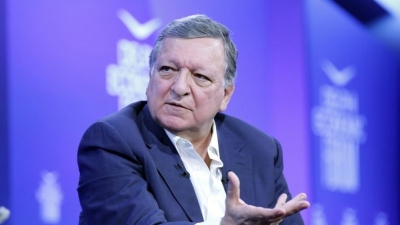EU expands international cooperation on critical raw materials
A new international forum aims to increase global cooperation in critical raw materials, which are vital to the world’s green and digital transitions. It includes the European Union and its fellow members of the existing minerals security partnership but crucially also brings to the table four additional countries, including the mineral-rich central Asian states of Kazakhstan and Uzbekistan writes Political Editor Nick Powell.
Critical raw materials (CRMs) are indispensable for a wide set of technologies needed for the European Union’s strategic sectors such as net-zero industry, digital, space and defence. The demand for such critical raw materials has never been higher but is certain to grow further, driven by the green and digital transitions. For instance, EU demand for lithium used in electric vehicle batteries and energy storage is expected to increase twelve-fold by 2030. Meanwhile, the supply of CRMs is at risk from major geopolitical, environmental and other challenges.
In an important development, Kazakhstan and Uzbekistan, together with Namibia and Ukraine have joined with the 15 existing mineral security partners of Australia, Canada, Estonia, Finland, France, Germany, India, Italy, Japan, Norway, the Republic of Korea, Sweden, the United Kingdom, the United States and the EU itself. The enlarged group has launched a new Minerals Security Partnership Forum.
The Critical Raw Materials Club announced by the European Commission now becomes a full part of the MSP Forum. The Forum will bring together resource-rich countries and countries with high demand for these resources, with a project group focused on supporting and accelerating the implementation of sustainable use of critical minerals.
A policy dialogue will identify policies for boosting sustainable production and local capacity. It will facilitate regulatory cooperation to foster fair competition, transparency and predictability, as well as promoting high environmental, social, and governance standards throughout the supply chains.
Membership of the MSP Forum will be open to additional partners who are ready to commit to key principles, including the diversification of global supply chains and high environmental standards, good governance and fair working conditions. In a sign of strong transatlantic cooperation, the EU and the United States will jointly lead the new forum. Together with the other partners, they are both reaching out to prospective members in the Americas, Africa, Asia and Europe.
The MSP Forum builds on the EU’s Critical Raw Materials Package adopted in March 2023, which emphasised the need for more diverse and more sustainable CRM supply chains through new, mutually supportive international partnerships. The latest is between the EU and Uzbekistan, which have signed a Memorandum of Understanding launching a strategic partnership on critical raw materials. This important agreement marks a significant step towards securing a diversified and sustainable supply of CRMs for the green and digital transitions both in the EU and Uzbekistan.
AdvertisementThe MoU signed by European Commission Executive Vice-President Valdis Dombrovskis and Uzbekistan’s Minister of Investment, Industry and Trade Laziz Kudratov underscored the partners’ shared commitment to enhance cooperation in the field of CRMs. This will integrate sustainable CRM value chains, via networking, selection of project proposals, joint development of projects, promotion and facilitation of trade, and investment linkages along the whole value chain.
It will be important to improve the resilience of CRM supply chains and establish a dialogue to enhance the transparency of measures related to investments, operations and exports. Funding needs to be mobilised for projects resulting from the EU-Uzbekistan partnership and for the development of infrastructure, such as the development of clean energy supply.
It’s foreseen that ares of cooperation will include achieving sustainable and responsible prospecting and production, as well as research and innovation, including sharing of knowledge and technologies related to sustainable exploration, extraction, processing and recycling of CRMs. The two sides will also collaborate in building capacity to enforce relevant rules and in developing training and skills.
Next steps include agreeing an operational roadmap with concrete steps towards its implementation, as part of the EU’s commitment to establishing mutually beneficial CRM value chain partnerships with resource-rich countries. Uzbekistan has the second-largest reserves of CRMs in Central Asia, boasting significant deposits of various minerals such as copper, molybdenum, and gold. The country’s mining strategy aligns with its ambitions to increase the processing of CRMs for both domestic and international industries, particularly in automotive and consumer electronics.
The partnership is in line with the Global Gateway strategy, the EU’s key initiative for investments for sustainable and high-quality projects around the world, taking into account the needs of partner countries and ensuring lasting benefits for local communities. The EU will mobilise up to €300 billion of such investments by 2027.
The EU has previously established raw materials partnerships with Canada (2021), Ukraine (2021), Kazakhstan (2022), Namibia (2022), Chile (2023), Argentina (2023), Zambia (2023), the Democratic Republic of Congo (2023) and the Autonomous Territory of Greenland (2023).
Share this article:



